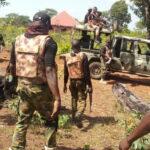Activities of Boko Haram terrorists in the North-East have resulted in the death of over 40 to 50 percent of the teachers in the zone.
Managing Director, North East Development Commission (NEDC), Mohammed Alkali, disclosed this Thursday at the 50th session of the State House Briefing organised by the Presidential Communications Team at the Presidential Villa, Abuja.
- NANS threatens mass action over ASUU strike
- NIGERIA DAILY: Why Nigeria Is Recording Increase In Building Collapse
He said teachers in the zone remained the primary target of the terrorists.
He said the commission prioritised the training of teachers in the region because their ranks had been substantially depleted.
He said “The scarcest product now, not only in Nigeria but elsewhere, is teachers. In the North-East, over 40-50 percent of teachers have either been killed or something has happened to them because tag of the insurgency is the Boko Haram and teachers are the instruments of this so called Boko Haram and they’re the primary target of those people.
“Most of them have been killed or something must have happened to them. So, we need more teachers in the region.”
Alkali said the federal government had completed the construction of 1,000 housing units as part of its resettlement efforts for millions of inhabitants displaced by the 13-year insurgency in the North East geo-political zone.
He said the houses had been handed over to the Borno State Government who distributed it to various households.
He said the houses were built in Ngwom, Borno, with plans to build 500 housing units in five other affected states each, costing N17.5bn.
He said lack of robust education system had fuelled the insurgency in the zone, noting that the commission had created an Education Endowment Fund with a seed capital of N6bn with plans to dedicate 10 per cent of its annual allocation to the Fund.
He said to execute its mandate according to the North East Stabilisation and Development Master Plan in the next 10 years, the NEDC required at least N31.05tn.
NEDC Executive Director, Humanitarian Affairs, Musa Yashi, said some of the internally displaced persons in the North East were not willing to return to their ancestral homes.
Yashi said 20 to 30 per cent of the displaced persons did not live in camps.

 Join Daily Trust WhatsApp Community For Quick Access To News and Happenings Around You.
Join Daily Trust WhatsApp Community For Quick Access To News and Happenings Around You.


